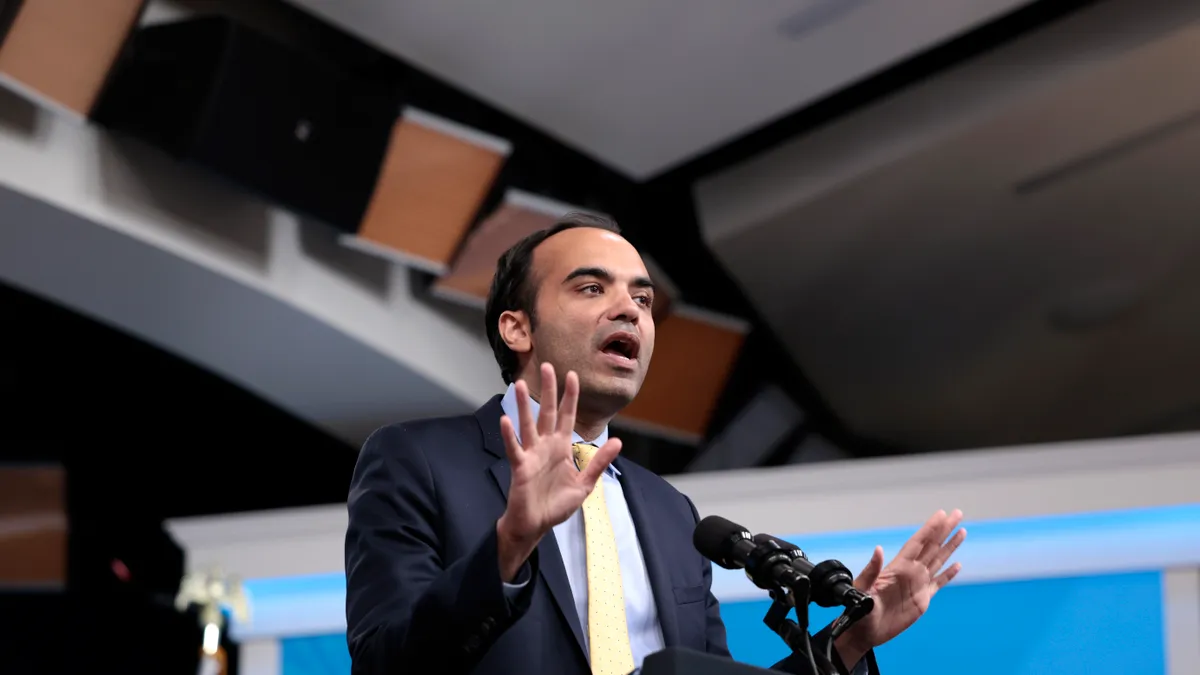Consumer Financial Protection Bureau Director Rohit Chopra on Wednesday urged lawmakers to adopt vital measures to safeguard financial data from misuse and abuse by payment processing firms and financial institutions.
While speaking at a Senate Banking Committee hearing on Capitol Hill — testifying for the first time since the Supreme Court upheld the constitutionality of the federal agency’s funding structure — Chopra cited reports about JPMorgan Chase and PayPal’s plans to use sensitive customer data on income and spending for “surveillance-based targeting.”
The agency is actively monitoring developments in the market, but the CFPB is eager to collaborate with lawmakers to establish more robust protections against data abuse and misuse, he said.
“These plans to monetize sensitive financial transaction data are a reminder that the United States is slowly lurching toward more financial surveillance and even financial censorship,” Chopra said in his prepared remarks.
In April, JPMorgan announced a new business unit — Chase Media Solutions — that would enable brands to connect directly with the financial institution’s 80 million customers and help consumers earn cash back with brands.
PayPal did not respond to Reuters' request for comment. However, Trish Wexler, a JPMorgan Chase spokesperson, told the publication that the lender allows customers to opt in for shopping coupons.
But, “no transaction or other personal information is ever shared in developing these discount offers,” Wexler said.
Chopra also called on lawmakers to advance legislation that would accelerate the adoption of open and decentralized banking in the U.S. Last week, the agency laid out the first part of the open banking framework highlighting the qualifications necessary for the industry’s eventual standard setters and plans to “set the stage for finalizing the rest of the rule this fall,” according to Chopra.
While highlighting the agency’s work in the semiannual report to Congress, the head of the regulatory watchdog mentioned a proposed rule under the Fair Credit Reporting Act to restrict the use of certain sensitive data by data brokers. Data brokers gather information on Americans that can be purchased by scammers and other actors belonging to countries of concern, he said.
The CFPB has played a crucial role in protecting financial data while simultaneously promoting competition and fostering new offerings, Chopra asserted. The CFPB returned $20.7 billion to consumers and made intangible returns to more than 205 million harmed Americans, he noted.
“We are currently on track to save customers $20 billion in junk fees every year. The CFPB created a consumer complaint function that is on track to process over 2 million consumer complaints about banks or financial companies this year,” Chopra said.
Chopra touched on the agency’s work to reduce credit card late fees to $8, estimated to save $10 billion in late fees annually when the rule takes effect. Since over 750 million credit cards are in circulation and it is the most common lending method in the U.S., “it’s critical that we have a market where small financial institutions can compete to offer consumers the best possible rates and fees,” Chopra noted.
During the Senate hearing, Chopra fielded questions on the bureau’s funding structure from its detractors. Sen. John Kennedy, R-LA, pointed out that the CFPB’s funding comes from the transfers made by the Federal Reserve Board from the combined earnings of the Federal Reserve system. Since September 2022, however, the Fed has not generated any earnings, operating at a loss.
“How are you entitled to any money right now? The Federal Reserve doesn't have any earnings,” Kennedy asked the CFPB director.
These arguments center around the fact that the CFPB’s funding structure violates the Constitution’s separation-of-powers principle because the money comes from the Federal Reserve, not Congress.
Chopra, for his part, dismissed the claims. “I can tell you we've looked at this issue. We do believe wholeheartedly everyone is complying with the statute,” Chopra said.














